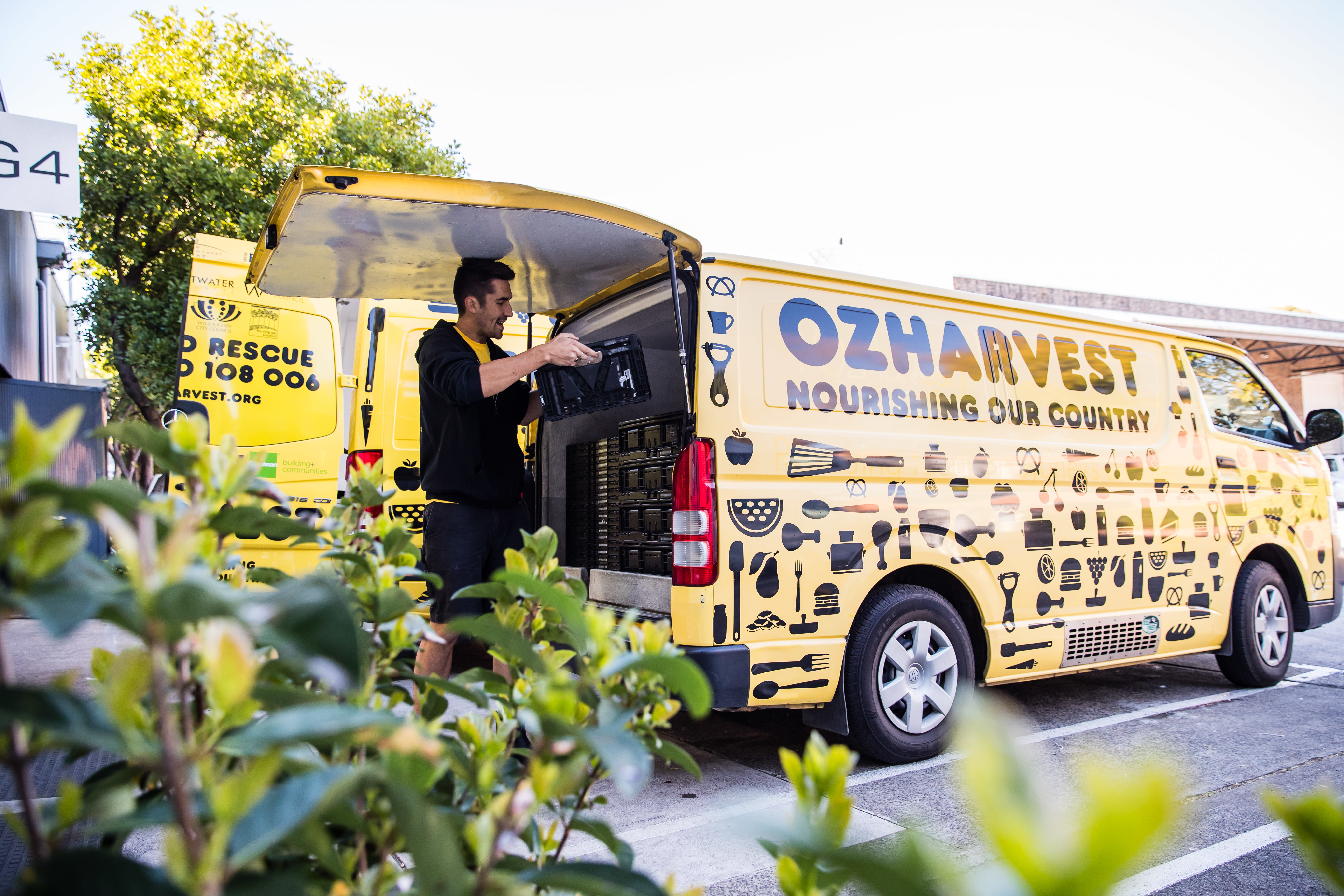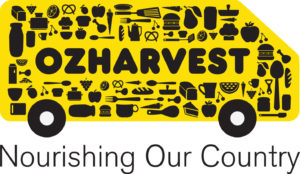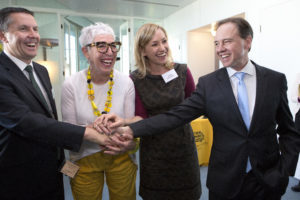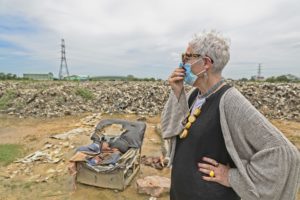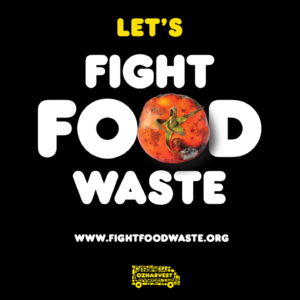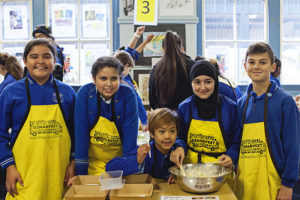Ronni Kahn has been fighting food waste long before the UN Sustainable Development Goals were on the agenda. As a producer of large scale, high-end events, she had seen first-hand the huge volume of food that went to waste alongside those who were going hungry within her own community in Australia. From the moment she realised the extent of the food waste problem, Ronni knew that urgent action was required. 
In the Photo: Ronni Khan Photo Credit: Toby Burrows
Her solution was “OzHarvest,” born from the simple concept of stopping good food from going to landfill and instead getting it to people in need. However, getting OzHarvest off the ground came with a few challenges. With food rescue being an unknown concept in Australia, Ronni, along with a team of pro-bono lawyers, lobbied to change legislation to allow food donors to share surplus produce without fear of liability. Fifteen years later, OzHarvest has grown to become a national food rescue organisation, with its iconic yellow vans becoming a well-loved feature in communities across Australia. But rescuing food was only one small part of the $20 billion problem—Ronni knew that food waste needed to be on the government’s agenda for serious change to happen.
In the Photo: OzHarvest Banner Photo Credit: OzHarvest
In June 2015, three months before the launch of the UN SDGs, OzHarvest succeeded in bringing together a tripartite agreement for the government to set a national target of halving food waste by 2025 (this has since been updated to reflect the SDG 12.3 of halving food by 2030). In partnership with the UN’s global Think.Eat.Save campaign to address food waste, OzHarvest hosted a press conference to announce the target. The wheels for change were finally set in motion, but they remained frustratingly slow.
In the Photo: Ronni Khan with officials in Canberra as part of the Think.Eat.Save campaign Photo Credit: OzHarvest
After a year with no notable government action, OzHarvest brought together a group of key industry stakeholders and created the Zero Food Waste Forum to start discussing means of tackling the food waste issue. This finally kick-started a governmental steering committee and the development of the National Food Waste Strategy, announced in November 2017. This framework was a step in the right direction, but the level of initial funding was underwhelming and immediate action still seemed a long way off.
Halving food waste is a big job that will take time and requires change at all levels of society, but to change the world we need to change our behaviour first… In Australia over five million tonnes of food goes to landfills each year and half comes from our homes, so let’s tackle this problem from the bottom up!
With half of food waste coming from homes, it was clear that consumer awareness and education was also needed to stop food being wasted to achieve the SDG goal. A recent report by the Boston Consulting Group even put a cost saving of $260 billion annually against consumer awareness as one of the five key drivers for change on this issue. Ronni has stated, “Halving food waste is a big job that will take time and requires change at all levels of society, but to change the world we need to change our behaviour first… In Australia over five million tonnes of food goes to landfills each year and half comes from our homes, so let’s tackle this problem from the bottom up!”
In the Photo: A scene from the Food Fighter film of Ronni Khan at a landfill site in Thailand Photo Credit: Bruno Kataoka
On World Environment Day (June 5), using the momentum from an independent documentary “Food Fighter,” which featured Ronni’s journey of tackling the issue head-on, OzHarvest launched Australia’s first national consumer education program on food waste: “Fight Food Waste.” In addition to outlining the scale of the problem, it identified simple solutions to change behaviour at home, starting with a new mantra, “Look.Buy.Store.Cook.”
The powerful combination of an awareness-raising, issue-led documentary and an always-on digital campaign that offered immediate consumer focused solutions was a great launchpad for the country-wide movement against food waste. Over 35,000 Australians signed up on fightfoodwaste.org to join the movement, with 150 articles generated through print, tv, radio and online media reaching a combined audience of 3.5 million. An additional 500,000 were reached via a social media influencer strategy. Donated above-the-line media such as out-of-home, print and radio advertising spread the message further across Australia.
Related Articles:
![]() “FUTURE OF FOOD: REDUCING WASTE”
“FUTURE OF FOOD: REDUCING WASTE”
![]() “CHAMPIONING THE FUTURE: THE CITY OF SYDNEY”
“CHAMPIONING THE FUTURE: THE CITY OF SYDNEY”
by Clover Moore
“![]() AUSTRALIA: EMPOWERING INDIGENOUS POPULATION”
AUSTRALIA: EMPOWERING INDIGENOUS POPULATION”
by Paul Ronalds
OzHarvest believes that Fight Food Waste has the potential to become a global movement, spurring consumers worldwide to take action. This would need to be facilitated through multi-sector partnerships with governments, corporates and private sector businesses, local councils, community groups, workplaces, universities and schools. Ronni’s goal for OzHarvest is to inspire joint action with a network of like-minded partners across the world to activate the most powerful change-makers—consumers.
In the Photo: Fight Food Waste Campaign Poster Photo Credit: OzHarvest
The next phase of the Fight Food Waste program is underway and will develop solutions that address people’s everyday reality and aspirations when it comes to preventing food waste. With a vision to make the prevention of food waste a social norm, the true potential for change will be discovered and achieved through empowering passionate individuals to inspire their networks to take action. OzHarvest is building this program to include a multi-sector approach with multiple touch points, but with the underlying philosophy that people influence people. There are plenty of exciting opportunities for partners to be in at the ground level and help influence and shape this next phase.
The power of children to influence change should never be underestimated. Recognising this and identifying a gap in sustainability, food waste and nutrition knowledge in the current Australian education programs, OzHarvest created FEAST (Food Education and Sustainability Training). The new curriculum-aligned program teaches kids about sustainability, food waste and nutrition using hands-on cooking and inquiry-based learning. It delivers vital education to the entire school community, influencing teachers, families, care-givers and students to encourage healthy and thriving communities.
In the Photo: Belmore South students participating in the FEAST pilot program Photo Credit: Vanessa Rowe
Over 300 students across four primary schools in Sydney are taking part in FEAST’s pilot program: exploring the role food plays in our everyday lives, learning about food waste and the importance of protecting the planet, cooking healthy food, and creating their own recipes using food that might otherwise be wasted. The results are incredibly encouraging and show FEAST is well on the way to achieving its vision and objectives. The national launch and future of this program relies on securing a funding partner. There are just under four million school children in Australia, who can be reached through 9,500 schools. If we are serious about halving food waste and living sustainably beyond the 2030 goal, kids need to understand the issue and be given the tools to be on board to make the change.
As a for-impact organisation, OzHarvest is focused on doing whatever it takes to “Nourish our Country” and fight food waste at the same time. It is developing relevant programs with great potential to influence change and work towards achieving the SDG of halving food waste by 2030. The clock is ticking and with only 11 years and four months to go, it is time to stop talking about it and take action!
https://vimeo.com/268911455


